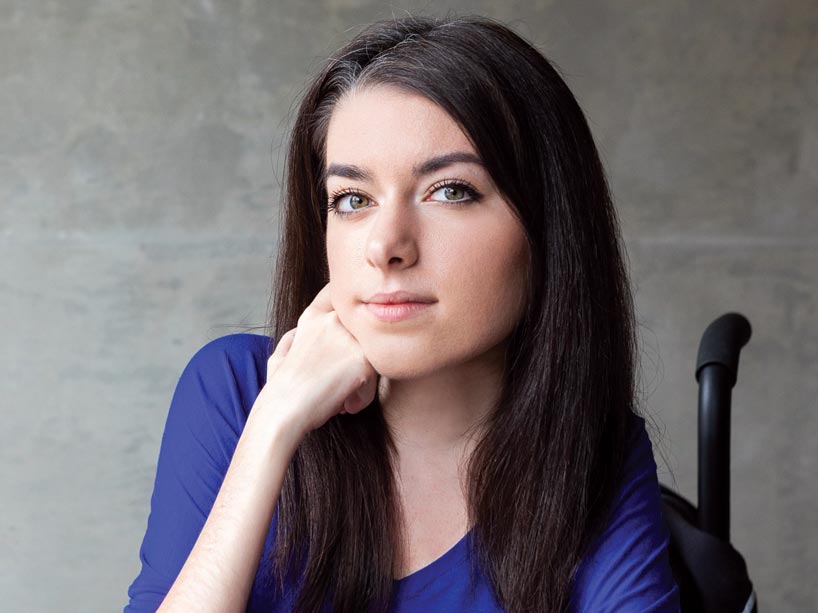Maayan Ziv’s AccessNow receives federal funding

“Our users message us with stories of challenges and more joyful moments,” says Maayan Ziv, creator of AccessNow. Photo credit: Denise Militzer.
Ryerson graduate Maayan Ziv’s company AccessNow (external link) has received an investment of more than $2.7 million from the federal government. This investment will enable AccessNow to continue addressing systemic barriers to engaging in the digital economy.
AccessNow is a global online platform that crowdsources information on public transit and venues such as restaurants and businesses that are accessible to persons with disabilities. Ziv started the platform as a project in her master of digital media program at Ryerson and it’s currently employed in 35 countries. She further developed AccessNow as a company in the DMZ at Ryerson University from 2015 to 2017.
Announced on Aug. 1 by Carla Qualtrough, minister of public services and procurement and accessibility, the government’s investment (external link) will help AccessNow expand the reach of its platform in Canada, allowing people to share information—in both of Canada’s official languages—about the accessibility features of public spaces through an interactive map.
“At AccessNow, we see the incredible potential to use technology to empower people of all abilities,” said Ziv. “We are so thankful to the Government of Canada for believing in our vision to develop a more connected and accessible country with our platform. Our promise is to foster a global digital ecosystem that includes partners in the private sector and government and the grassroots power of community.”
Ryerson University Magazine interviewed Ziv (external link) earlier this year, and below, in her own words, the entrepreneur talks about how she started AccessNow and her philosophy that creating access is something everyone can do.
Opening doors: How Maayan Ziv created a global accessibility app
I’d just started my second degree at Ryerson—a master of digital media—and my classmates and I were heading out to celebrate the beginning of the year. It was a place nearby, but off-campus; there was no way to find out in advance if it was accessible. When we got there, there were four steps to the entrance, so I had to find my way in through a narrow alleyway. It was stinky and dark, and we had to use flashlights and move garbage bins just so I could get in.
It’s a problem I’ve experienced my entire life. I have muscular dystrophy and I’ve used a wheelchair since I was a little kid. Finding accessible places usually involved a lot of time-consuming research, like calling every place I was ever going and trying to get someone on the other end of the phone who might have some kind of an idea whether their business is accessible—which most of the time, they don’t. It’s frustrating. For people with disabilities, it’s so much of an effort to just go about your day—let alone trying to find a good job, go to school or even have a decent social life.
That night, I realized that I had a unique opportunity to address a significant problem in an innovative way, because my program focused on tech and entrepreneurship. I decided to build a website that would use crowdsourcing to pinpoint the accessibility status of locations. But I had no background in tech and I’d never built a business before; my undergrad was in Radio and Television Arts. How do you take an idea and turn it into a real thing?
It was a matter of reaching out to people who had the answers. I tried to access as much of Ryerson as I could while I was there. We had a design and UX class, so I would spend time doing prototypes and wireframes, and collaborating with my classmates. I connected with entrepreneurs at Ryerson, and pitched and applied for grants. Initially, it was about being scrappy and leveraging opportunities that were given to students to develop new technology.
In 2015, a week before I graduated, AccessNow launched. More than three years later, we’re still going strong. When we started, there were other websites and apps that were doing similar things in specific cities or countries, but from day one, we wanted to be global. Today, we’re in 35 countries around the world, from Australia, to Tel Aviv, to Halifax.
Being in the tech space isn’t “wins” every day. It’s really tough work and there have been moments when we weren’t sure if we were going to be able to continue. But our community has grown and is motivated to create change. Our users message us with stories of challenges and more joyful moments.
Someone once reached out and said, “I’m planning on going to lunch with someone who needs an accessible location, and I used the app to find someplace that’s suitable.” That’s such a great story. People assume AccessNow is just for people with disabilities, but it’s for everyone—parents with strollers, event planners and educational institutions are all using the app. The same goes for contributing. It’s an open invitation—you don’t need to have a disability.
At its core, AccessNow is really about creating change when it comes to making a truly more accessible world for people of all abilities. It’s an integral component to how we create an inclusive culture and environment for all people. Regardless of who you are, you’re going to need access at some point in your life—so why not help today, instead of later?
Interview by Jessica Wynne Lockhart